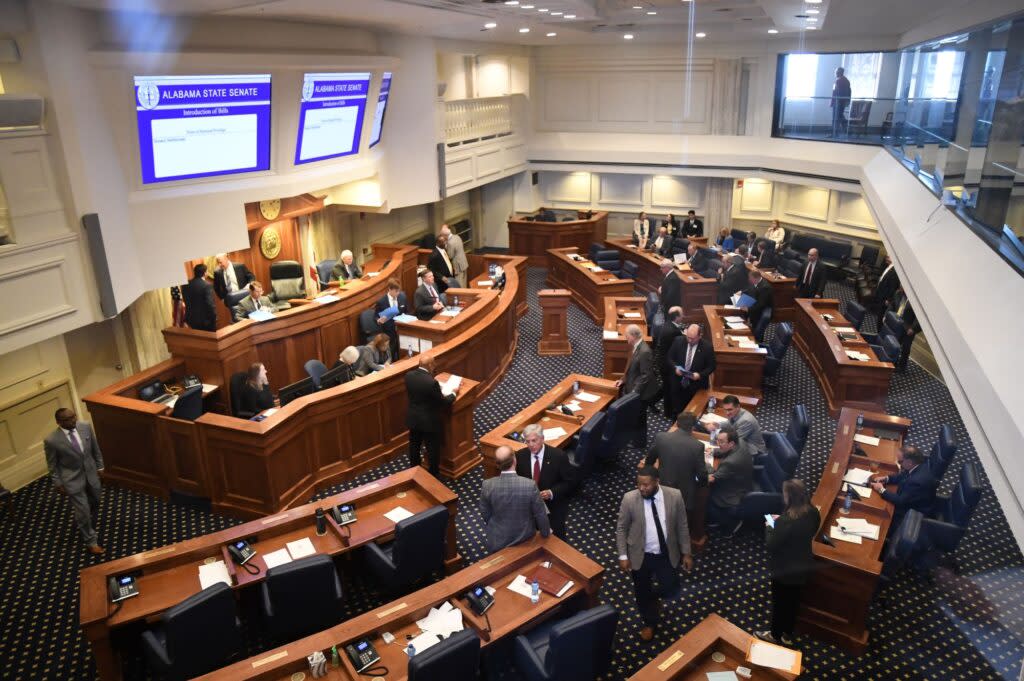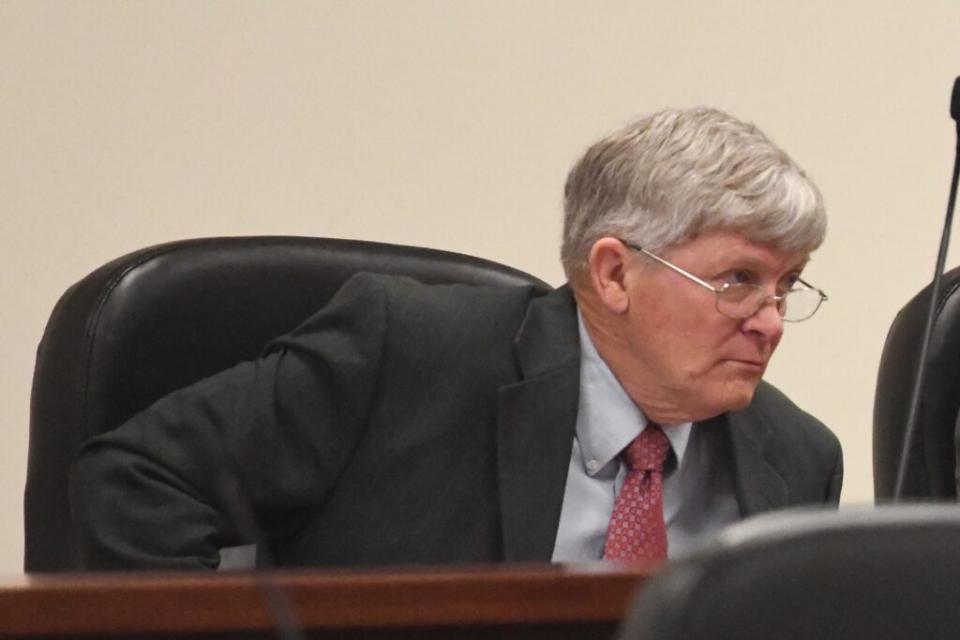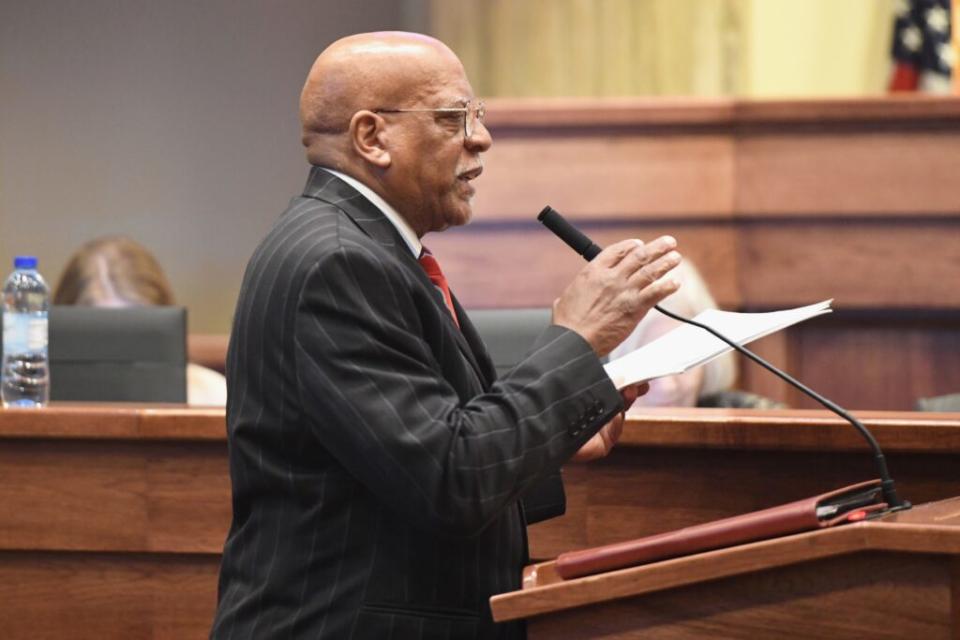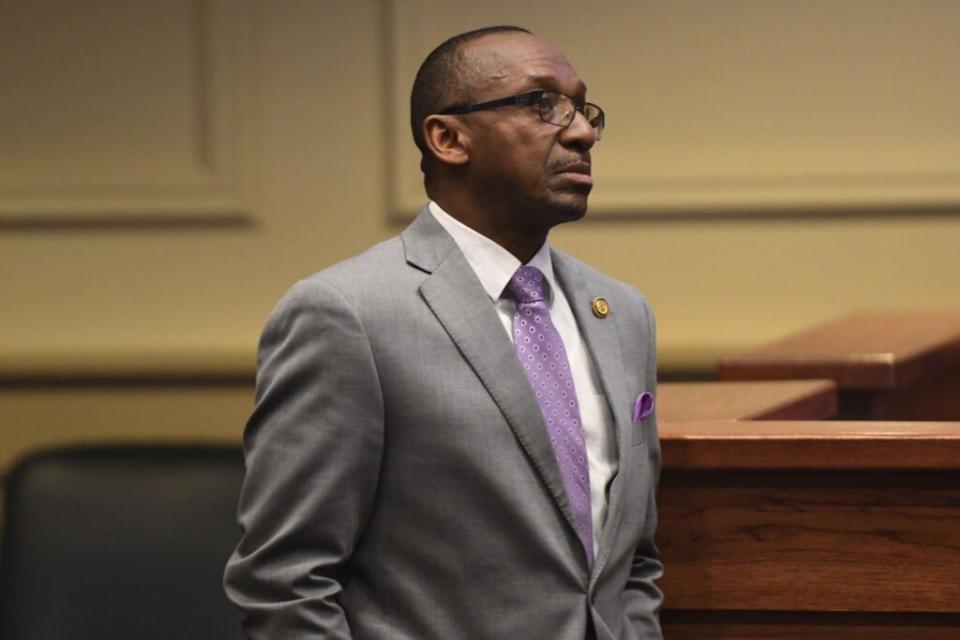Alabama Senate passes stripped-down gambling legislation

- Oops!Something went wrong.Please try again later.
- Oops!Something went wrong.Please try again later.
Senators work in the chamber of the Alabama Senate on Feb. 20, 2024 in Montgomery, Alabama. (Brian Lyman/Alabama Reflector)
The Alabama Senate Thursday approved gambling legislation from the House of Representatives, but only after making substantial changes to it.
HB 151 and HB 152, both sponsored by Rep. Chris Blackshear, R-Smiths Station, originally created a lottery and a state gambling commission and allowed casino gaming and sports wagering at seven different locations in the state. It also directed Gov. Kay Ivey to negotiate a compact with the Poarch Band of Creek Indians, who operate casinos in Atmore, Montgomery and Wetumpka.
The Senate version keeps the lottery and compact language, but dropped sports wagering and casino gaming. The bill would only allow pari-mutuel betting and historic horse racing machines at the seven locations.
GET THE MORNING HEADLINES DELIVERED TO YOUR INBOX
The changes came during a tense eight-hour Senate session Thursday that featured a long list of amendments. Many were opposed by Sen. Greg Albritton, R-Atmore, who carried the bill in the chamber.
Albritton, a longtime proponent of gambling legislation, told reporters after the meeting that it had been a “rough day.”
“You know it’s a bad day legislatively when you can’t get a tabling motion on a single bill, a single matter,” he said. “It was a pretty tough day. It was an unfriendly bill with a at least a semi-hostile crowd, and they were all skeptics of what was happening. It was kind of an interesting endeavor.”
HB 151, a constitutional amendment authorizing gambling, passed 22-11, with seven of the chamber’s eight Democrats joining 15 Republicans to approve the measure. All 11 no votes came from Republicans. Sens. Merika Coleman, D-Pleasant Grove and Larry Stutts, R-Tuscumbia were not listed as voting.
HB 152, enabling legislation that sets out enforcement, taxation and distribution of revenues, also passed 22-11, with the same breakdown.
The House measure faced stiff resistance from a handful of senators in the upper chamber, who pressed for changes for weeks.
The bills go back to the House, where Blackshear and Rep. Andy Whitt, R-Harvest, who worked on the legislation, have both said they were not consulted on the Senate’s changes.
“We will review both amended bills over the next few days,” Whitt wrote in a text message on Thursday. “Cleaning up illegal gaming across the state remains my top priority.”
Blackshear said in a Thursday evening phone call that he has not reviewed the Senate-passed versions for either piece of legislation. He said there have not been any conversations about a conference committee yet.
“I have some opportunity next week since we’re on spring break to review the legislation passed by the Senate this evening,” he said.
The changes will reduce the money expected to go to state coffers from a maximum of $1.2 billion in the House version to $350 million in the Senate, according to Albritton Tuesday.
A fight over distribution
Sen. Greg Albritton, R-Atmore, the chair of the Senate Finance and Taxation General Fund Committee, listens to a budget presentation from the Alabama Community College System on March 7, 2023. The presentation came on the first day of the Alabama Legislature’s 2023 regular session. (Brian Lyman/Alabama Reflector)
The Senate also changed the distribution of money in the bill. Under the House version, money from the lottery would have been appropriated to education programs, like post-secondary scholarships, while casino and sports betting revenue would have gone to programs like mental health and “rural health,” using language similar to Medicaid expansion. Within those limits, the Legislature would have had broad scope to appropriate the money as they saw fit.
The Senate stripped the “rural health” language and directed that a third of the money generated go to education; a third to the General Fund and a third to roads and bridges.
Disagreements over distribution led to a sharp fight on the floor. The Senate bill originally delayed distribution of gambling revenues to education and infrastructure until March 30, 2029, directing money to the General Fund to pay for a proposed men’s prison in Escambia County.
Sen. Andrew Jones, R-Centre, offered an amendment to let distribution to education and infrastructure begin immediately. Albritton objected, saying there was no other revenue source to build a prison.
“We cannot continue to put our employees or even the inmates — I’m not talking about giving them color TVs, I’m not talking about giving them — what’s those — the adjustable beds,” he said. “Okay? No. What I’m talking about is a means where we can house them independently and single cells, break that up so they can even be safe, so that we can feed them, so we can provide them the medical care that we’re obligated to give.”
The Senate approved Jones’ amendment which, combined with a dispute over another amendment, led Albritton to try to stop consideration of the bill for the day. When that motion failed, Albritton filibustered his own bill for an hour.
The senator said the new prison was important to his district with Holman Correctional Facility in Atmore shutting its doors, and said the Legislature was creating new crimes without creating new spaces to house those convicted under them.
At the end of the hour, Senate Pro Tempore Greg Reed, R-Jasper, yielded time to Albritton, who said that the body had spoken.
Monopoly?
Sen. Rodger Smitherman, D-Birmingham, expressed concerns that a compact could give the Poarch Band a monopoly on casino gambling, like slots and table games, that would be off-limits to other operators.
“I think trying to make sure that the companies, I mean the businesses that are not under the federal government, would have some kind of parity in terms what’s provided,” he said.
Smitherman offered an amendment that said that if the federally-recognized tribe has access to casino-style gaming, then other facilities can do the same. Albritton, who said that the House version had addressed that problem, said he had to try to get the Senate version passed, and moved to table the amendment.
“My job today on this is to get this substitute through this body in a way that we can hopefully send it back down to the House for further review,” he said.
To reporters after, Senate Minority Leader Bobby Singleton, D-Greensboro, said he thinks other sites need more than historic horse racing machines to stay competitive with tribal properties, but added that the technology available had helped.
“I personally think they need more, to be honest with you, but I do understand that they have come a long ways in terms of the technology and software that’s out there now,” he said. “It has come light years from where they were at least three years ago.”
The Senate passed an amendment from Sen. Robert Stewart, D-Selma, to allow a facility in Lowndes County to remain open.
‘Fourth quarter’
Senate Minority Leader Bobby Singleton, D-Greensboro, listens to debate in the Alabama Senate on Feb. 20, 2024 at the Alabama Statehouse in Montgomery, Alabama. (Brian Lyman/Alabama Reflector)
The Senate legislation as filed would allow the state gaming commission to set taxes on the seven facilities between 24 and 32%. The commission would have the power in the enabling legislation to set different rates for different facilities based on a host of factors, including local crime rates.
Smitherman offered an amendment to lower the rate to 20 to 28%, which passed the Senate.
The Senate version would also set the date of an election on the measure to Sept. 10, over two months before voters are expected to turn out for the presidential election. In the last election on a state lottery in 1999, the Legislature set the election for October, which drew a low turnout and may have contributed to the measure’s defeat.
Singleton said to reporters they were in the “fourth quarter” of passing the legislation.
“The House passed a comprehensive bill that dealt with casinos, and so we just want to be able to sit down with them,” he said. “And I think that we can get to a point to where we can have something viable to where the state can win. And also the people of the state of Alabama will have something they can vote on.”
The post Alabama Senate passes stripped-down gambling legislation appeared first on Alabama Reflector.



